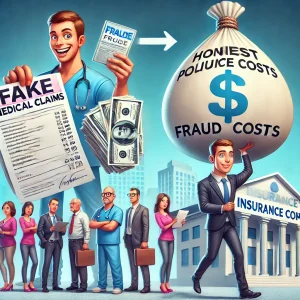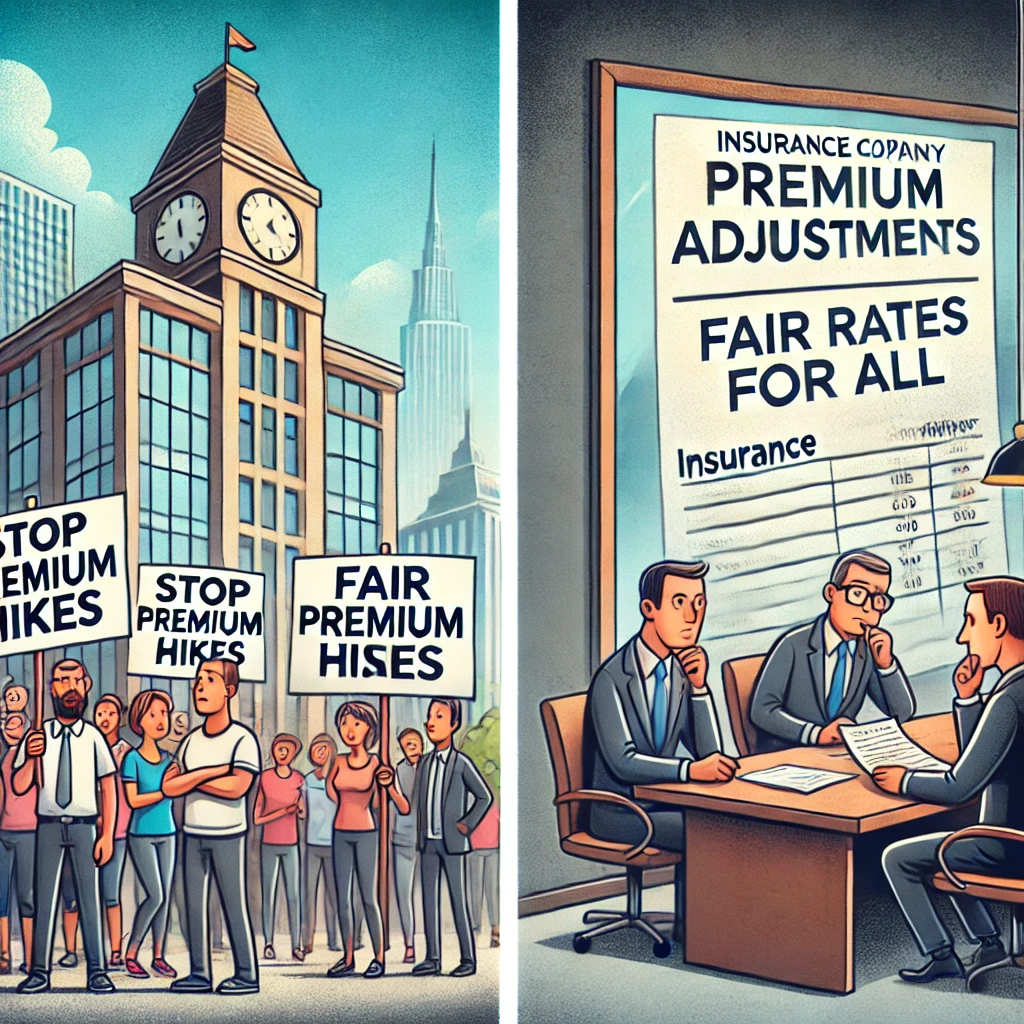Understanding the Link Between Fraud and Rising Medical Insurance Premiums.The escalating cost of medical insurance premiums is a concern that continues to plague many individuals and families. While several factors contribute to this upward trend, two key elements stand out: fraud and high medical claims. Understanding the link between these two factors and rising medical insurance premiums is crucial in comprehending the dynamics of the health insurance market.
Fraud and High Medical Claims Cause Premium Hikes
Fraud is a pervasive issue in the healthcare industry, with its impact reverberating across the entire system, including insurance premiums. Essentially, healthcare fraud involves deceptive practices that result in unauthorized benefits. This could range from a healthcare provider billing for services not rendered, to a patient falsifying information to receive benefits they are not entitled to. These fraudulent activities inflate the cost of healthcare, as insurance companies have to pay out more in claims than they should. Consequently, to cover these losses and maintain profitability, insurance companies often resort to increasing premiums for all policyholders.
Moreover, the prevalence of fraud in the healthcare sector is alarmingly high. According to the National Health Care Anti-Fraud Association, the United States loses tens of billions of dollars each year due to healthcare fraud. This staggering figure underscores the significant role that fraud plays in driving up the cost of medical insurance premiums.
Insurance went up
In addition to fraud, high medical claims also contribute to the rise in insurance premiums. Medical claims refer to the requests made by insured individuals or healthcare providers to insurance companies for services rendered. When these claims are high, it means that the cost of healthcare services is also high. This could be due to several reasons, including the rising cost of medical procedures, prescription drugs, and advanced medical technology.
Insurance companies operate on the principle of risk pooling, where the premiums collected from all policyholders are used to pay for the claims of those who need medical care. Therefore, when the cost of medical claims is high, insurance companies have to pay out more. To balance this out and ensure they remain financially viable, insurance companies often increase the premiums charged to policyholders.
Furthermore, the aging population and the increasing prevalence of chronic diseases also contribute to high medical claims. As people age, they typically require more medical care, leading to higher claims. Similarly, chronic diseases often require long-term care and expensive treatments, further driving up the cost of claims.
Medical insurance premium skyrocket
In conclusion, fraud and high medical claims are significant factors contributing to the rise in medical insurance premiums. Fraud inflates the cost of healthcare by causing insurance companies to pay out more in claims than they should, while high medical claims reflect the rising cost of healthcare services. Both these factors put financial pressure on insurance companies, leading them to increase premiums to maintain profitability. Therefore, efforts to control healthcare costs and curb fraud could go a long way in mitigating the rise in medical insurance premiums.The escalating cost of health insurance premiums has become a significant concern for many individuals and families.
One of the primary factors contributing to this price surge is the high cost of medical claims. This article aims to shed light on how high medical claims contribute to skyrocketing insurance premiums, and how fraudulent activities exacerbate this issue.
Insurance companies calculate premiums based on the risk they undertake to cover the insured’s potential medical expenses. When the cost of medical claims rises, insurance companies are compelled to increase premiums to maintain their financial stability and continue providing coverage. High medical claims can result from several factors, including the rising cost of healthcare services, increased utilization of services, and the prevalence of chronic diseases.
The cost of healthcare services has been on an upward trajectory for several years. This increase is due to various factors such as advancements in medical technology, the high cost of prescription drugs, and the growing demand for specialized healthcare services. As these costs rise, insurance companies must pay more to cover the insured’s medical expenses, leading to higher medical claims.
Increased utilization of healthcare services also contributes to high medical claims. As people live longer, the demand for healthcare services increases, particularly for chronic diseases and conditions that require long-term care. This increased demand leads to more claims being filed, which in turn, drives up the cost of insurance premiums.
The prevalence of chronic diseases is another factor that contributes to high medical claims. Chronic diseases such as heart disease, diabetes, and cancer require ongoing medical care, which can be costly. Insurance companies must cover these expenses, leading to higher claims and subsequently, higher premiums.
Why medical premium increase
While high medical claims are a significant factor in rising insurance premiums, fraudulent activities further exacerbate this issue. Health insurance fraud is a widespread problem that costs the industry billions of dollars each year. This fraud can take many forms, including billing for services not rendered, upcoding (billing for a more expensive service than was actually provided), and unbundling (billing each step of a procedure as if it were a separate procedure).
These fraudulent activities lead to inflated medical claims, which insurance companies must pay. To recoup these losses, insurance companies often increase premiums, passing the cost onto the insured. This not only leads to higher insurance costs for everyone but also undermines the integrity of the healthcare system.
In conclusion, high medical claims and fraudulent activities are significant contributors to the escalating cost of health insurance premiums. The rising cost of healthcare services, increased utilization of services, and the prevalence of chronic diseases all contribute to high medical claims. Meanwhile, fraudulent activities inflate these claims further, leading to even higher premiums. Addressing these issues is crucial to curbing the rising cost of health insurance and ensuring that healthcare remains accessible and affordable for all. The impact of fraudulent activities on the escalation of health insurance premiums has led to the termination of the policy by the insured.
The escalating cost of health insurance premiums is a grave concern for many individuals and families. While several factors contribute to this upward trend, two significant culprits are fraudulent activities and high medical claims. These elements not only burden the healthcare system but also directly impact the policyholders.

Fraudulent activities in the healthcare sector have been a pervasive issue plaguing the industry for years. These activities range from billing for services not rendered, upcoding (billing for a more expensive service than the one provided), unbundling (billing each step of a procedure as if it were a separate procedure), and excessive services or supplies. The National Health Care Anti-Fraud Association estimates that healthcare fraud costs the nation about $68 billion annually, approximately 3% of the nation’s $2.26 trillion in healthcare spending. This staggering amount is inevitably passed on to consumers led to higher premiums.
High medical claims also play a significant role in escalating health insurance premiums. When policyholders file numerous or high-cost claims, insurance companies must pay out more in benefits. To balance these costs, insurers often increase premiums for all policyholders. This is particularly true in the case of chronic or severe illnesses, which can result in ongoing, expensive treatments. The high cost of medical care in the United States further exacerbates this issue. According to a study published in the Journal of the American Medical Association, the U.S. spends nearly twice as much on healthcare as 10 high-income countries, driven by the high cost of labour and goods, and a substantial amount of administrative costs.
Premium hikes impact to insured
The impact of these factors on health insurance premiums is significant. Insurance companies calculate premiums based on risk assessment. When fraudulent activities and high medical claims increase, the perceived risk also increases, leading to higher premiums. This is a vicious cycle that continues to perpetuate unless significant measures are taken to curb these issues.
Efforts to combat healthcare fraud and high medical claims are ongoing. The Affordable Care Act, for instance, has provisions to fight fraud, including increased scrutiny of claims, stricter penalties for those caught committing fraud, and improved information sharing among law enforcement agencies. On the other hand, initiatives to reduce high medical claims focus on promoting preventive care, managing chronic diseases more effectively, and implementing cost-saving measures in healthcare delivery.
However, these efforts alone are not enough. It requires a collective effort from all stakeholders, including healthcare providers, insurance companies, policyholders, and the government. Healthcare providers need to ensure accurate and ethical billing practices. Insurance companies should invest in advanced fraud detection technologies and promote cost-effective treatment options. Policyholders can help by understanding their health coverage, reviewing medical bills for accuracy, and reporting suspected fraudulent activities. The government, on its part, should enforce stricter regulations and penalties to deter fraudulent activities.
Fraud and High Medical Claims Cause Premium Hikes
In conclusion, fraudulent activities and high medical claims are significant contributors to the escalation of health insurance premiums. While efforts are being made to address these issues, it requires a concerted effort from all stakeholders to bring about a significant change. By tackling these issues head-on, we can hope to curb the rising cost of health insurance premiums, making healthcare more affordable for all.
